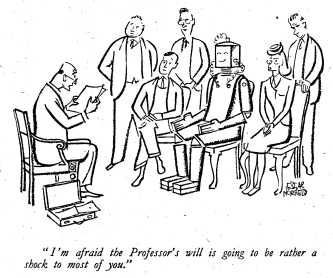 |
AISB2009
7th Apil 2009
Heriot-Watt University, Edinburgh, Scotland
http://www.aisb.org.uk/convention/aisb09
Symposium: Killer robots or friendly fridges: the social understanding of Artificial Intelligence
Call for Papers
OVERVIEW
For the non-specialist, the whole notion of Artificial Intelligence challenges fundamental understandings
of what it is to be human, with enormous implications for how we conceive ourselves, our artefacts and our societies.
AI's foundational goal was the construction of autonomous sentience. Yet, 55 years after Turing's seminal paper,
publicly visible achievements, beyond science fiction speculations or media exaggerations, still lie in faltering steps
in voice and image recognition, surveillance, computer games and virtual environments, not in truly intelligent everyday machines.
This symposium will offer a major forum for the discussion of the social understanding of Artificial Intelligence,
in particular the curious spaces between popular expectations of machines that meet our every whim, fears of humans enslaved
or eliminated by crazed super-brains, and the sober reality of toasters that still burn the bread.
At the start of the 21st century, it is timely to reflect not just on the technical achievements and pitfalls of the
now mature discipline of Artificial Intelligence, but also on its wider social understanding. While there have always been
ill-informed concerns about "robots taking over the world", the reality is both more prosaic and more complex.
People have long anthropomorphised complex artefacts which are capable of seemingly autonomous interaction. However,
recent advances in the deployment of believable characters and affective systems, both in graphical and robotic form,
have rekindled problematic social and ethical questions about our relationships with machines.
This symposium offers a fresh opportunity for interdisciplinary perspectives on the social understanding
of Artificial Intelligence, with the strong potential to bring together contemporary research in key technical, social, psychological and philosophical domains
|
TOPICS WILL INCLUDE:
- AI, Ethics and privacy
- AI and Public Policy
- Portrayal of AI in film, novel and other art forms
- Anthropomorphism and AI
- Attitudes towards robots and graphical characters
- Believability, naturalism and the uncanny valley
- Definitions of human-ness and AI artefacts
- AI and gender
- Social impact of AI
- Social expectations of AI
- Social perceptions of AI
- Social/legal/economic status of AIs
- Social/ethical implications of AI augmentation of humans
- Human/AI construct co-working
- If AIs could talk, would we understand them?
- What is it like to be an AI?
|

|
SUBMISSIONS
**Submitted papers will also be considered for a special issue of AI and Society - details**
We are seeking submissions of original papers that fit well with the symposium theme and topics. Papers should be
no more than 6 pages in length in the AISB convention format - see below. Papers should be submitted via the EasyChair system at http://www.easychair.org/conferences?conf=krff09. At least one author of each accepted paper
will be required to register and attend the symposium to present their work.
All papers from the AISB convention will be published in the AISB proceedings, with an ISBN number.
Authors of papers must sign a copyright declaration (to follow). However, this declaration is not exclusive -
it gives AISB the right to publish the paper, but does not prevent the author from publishing it in other venues.
IMPORTANT DATES
5th January 2009 : Submission deadline
2nd February 2009: Deadline for notifications sent to authors
23rd February 2009 : Camera read copies due
6-7 April 2009: Symposium
PROGRAMME COMMITTEE
Alison Adams, University of Salford
Ruth Aylett, Heriot-Watt University (co-chair)
Alan Bundy, University of Edinburgh
Bob Colomb, University of Technology, Malaysia
Roddie Cowie, Queens University Belfast
Ylva Fernaeus, Swedish Institute Computer Science
Rudi Lutz, University of Sussex
Greg Michaelson, Heriot-Watt University (co-chair)
Margit Pohl, Vienna University of Technologyv
Noel Sharkey, University of Sheffield
Peter Wallis, University of Sheffield
|

